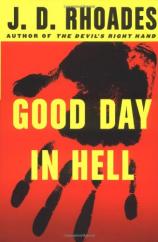Good Day in Hell
Review
Good Day in Hell
J.
D. Rhoades is quickly becoming the master of "redneck noir," a
classic description for dark thriller fiction set in the deep or
rural south. William Faulkner arguably is the godfather of this
genre and James Lee Burke is his heir, but there are such authors
as Ace Atkins, Jack Kerley, Jim Born and Jonathon King who also can
be counted among its practitioners.
Rhoades is one of the most recent additions to this list. His
latest novel, GOOD DAY IN HELL, is but his second, yet his voice is
as steady, confident and strong as a seasoned journeyman with a
groaning shelf of books to his credit. Rhoades's primary
protagonist is Jack Keller, a bail enforcement officer who travels
the rural areas that lie between North Carolina's growing urban
centers, resulting in an uneasy and often deadly mixture of old and
new South.
Keller's target in GOOD DAY IN HELL is Laurel Marks, a good girl
gone bad who is wanted on a parole violation. His girlfriend,
Deputy Sheriff Marie Jones, is simultaneously investigating the
robbery of a gas station and the murder of its proprietor, as well
as the apparent abduction of the proprietor's son. Neither Keller
nor Jones anticipates that their respective assignments are about
to intertwine into what is only the beginning of an explosive,
angry and senseless rampage, reminiscent of the Starkweather/Fugate
murders in the late 1950s.
What results is a dark character study of individuals on opposite
sides of good and evil who are alike in that they are drawn to
their inner, dangerous darkness even as their actions spring from
opposing motivations. The ending, which ironically takes place in
an area far removed --- geographically and socially --- is perhaps
inevitable, but carries with it a hope, however faint, of
redemption.
Rhoades's main strength is his ability to imbibe his characters
with subtle and conflicting complexities that by turns make them
interesting and extremely, almost painfully, real. Keller in
particular has miles of bad road within him that undoubtedly could
be explored for however many books Rhoades chooses to write about
it. Keller's venue of North Carolina is in such a state of change
and growth that he should have plenty to keep him busy in the years
to come. And the winner, of course, will be the reader of this fine
series. Recommended.
Reviewed by Joe Hartlaub on January 22, 2011





